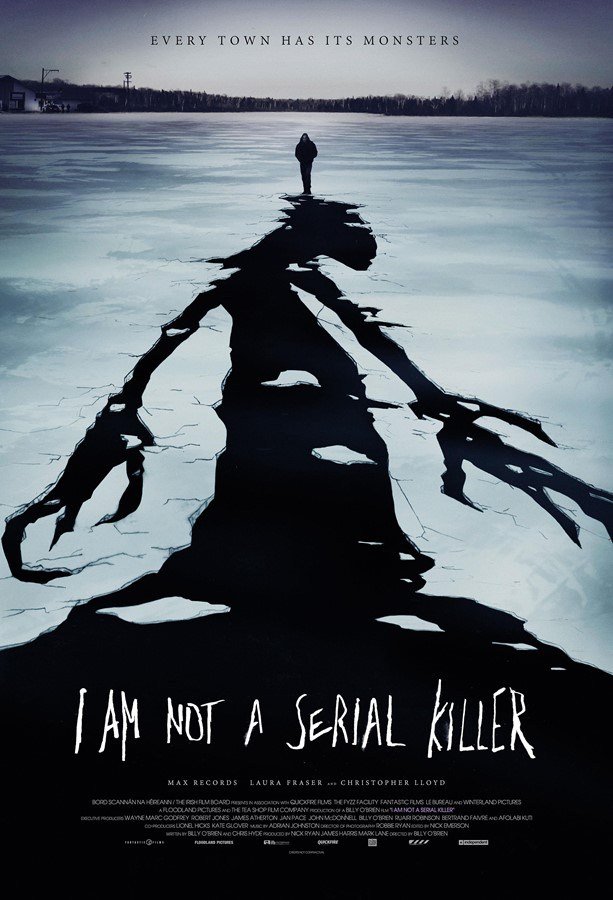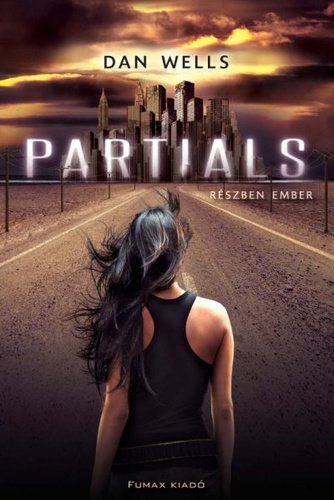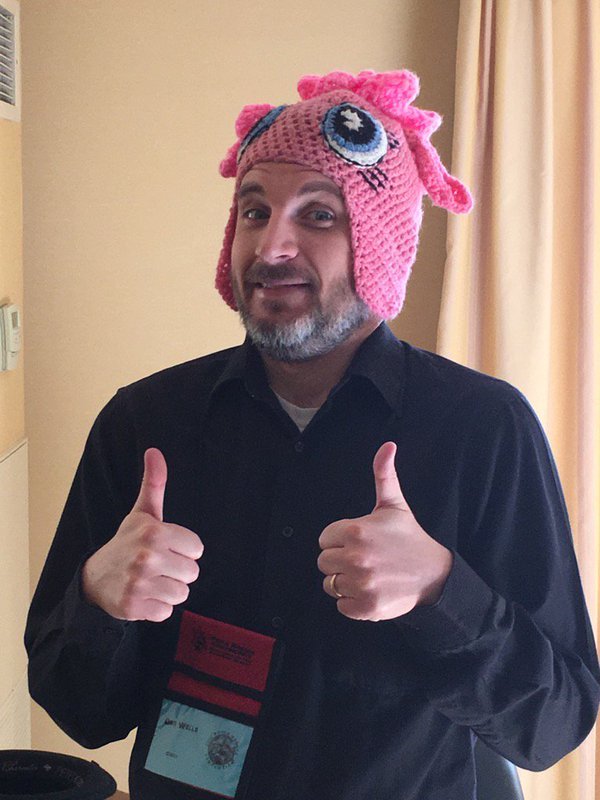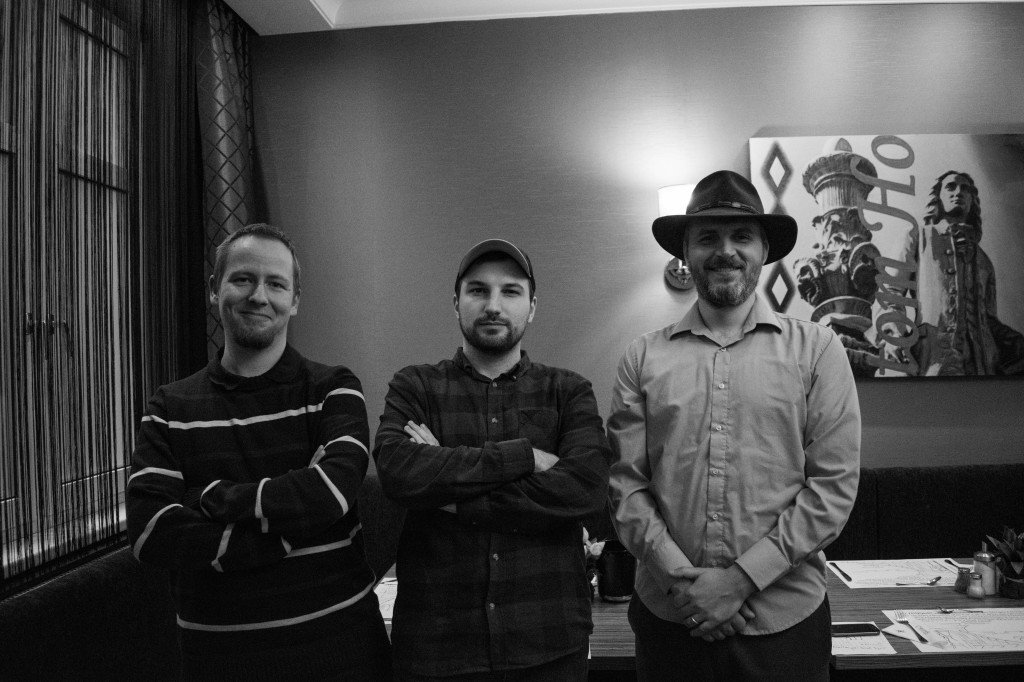This October, Fumax invited Dan Wells to visit Budapest. So two of our writers, Balázs Farkas and Ádám Sárpátki took the chance and interviewed him about his books, Writing Excuses and board games.
***
SFmag.hu: This question was asked the other night, but now you had the chance to see more of Budapest (maybe other parts of the country?). What did you learn about us? Any good or bad experiences?
Dan Wells: Everything’s been great. After the other night, the next day we went to Esztergom and on the way there, the Pázmány Péter University to just see some amazing architecture and amazing cities. It’s a beautiful country, and I’m very sad that I only have – what, twelve hours before I have to leave? So… But I’ll be back, I’m coming back.
I should also say I ate “tepsis csülök” which was wonderful but they brought it out in this giant thing, and it was way too much, and I ate maybe two thirds of it and I don’t think I have to eat again for the next month. I am full for ever now.
You have lived in Germany for a while and now you’ve seen Hungary as well. How do you see, what are the fundamental differences between Europe and the United States, and which continent do you prefer?
(Laughs) That is a tricky question. I love them both, and that’s part of the problem, is that now, no matter where I live I’ll never be happy again. When I’m here I miss America, and when I’m in America, I miss Europe. One of the things I miss the most about Europe, and Germany and Hungary are great examples, is that everything’s close and it’s easy to get around. You have really good trains and buses, public transportation. I miss being able to give my kid some money and say: “Go down to the bakery and get some bread for dinner.” And you can’t really do that in America, because you live so far away from everything you have to drive, so… Little, simple things like that are what I love about Europe.
Tell us about your first writing attempts. Did you write anything that was a disaster and never wanted to see it again?
Yes! I actually told my parents in second grade, so about eight years old, that I wanted to be an author. And so I started writing short stories, I started writing comic books, I wrote poetry, I wrote novels, and a lot of them are terrible. When I got to college – that’s when I finally decided: I’m gonna do this real and I’m gonna do this professionally. I wrote five books, which were terrible, before finally writing serial killer, number six.
Of those early five one of them I went back and fixed, and brought that out and published it in Germany, and we’re finally publishing it in the United States and that book is called, in German it’s called “Sarg niemals nie”, in America it’s “A Night of Blacker Darkness”.
The other four you’ll never see, ‘cause they’re terrible. But even now, just this spring, I decided I wanted to write a western, a cowboy book, and so I’ve worked on that for about two months, and it was so bad, that I said: “No, I’m gonna put this away, and I won’t look at it again”, and went back to science fiction. So… even now I write terrible things.
Are you more of a planner or a pantser?
I do both. I like to say that I plan the books, and then I pants the chapters. I will outline, I don’t even start writing a book until I’ve outlined every last tiny bit of it and know scene by scene what’s gonna happen and why, and what information needs to get revealed. But then, when it’s time to write the scene, I’ll just make it all up and sometimes ignore the outline completely, and… So it’s a nice combination outlining and discovering.
You have written in many genres, and as you mentioned the other day, you’d like to try yourself in new genres as well. But if you had to choose one singular genre you had to write in for the rest of your life, what would it be?
Oh, those are all tricky questions! I love trying new things, all the time. Those early five books, those that were terrible, most of them were fantasy. And when I’ve finally decided: “I’m gonna write a horror novel”, that’s when I finally wrote Serial Killer. So really, trying new things is the whole point. I want to get back to trying to write and publish a fantasy novel. I have two fantasy books in fact, that I want to publish. I would like to at some point make the cowboy novel work, but it’ll have to be different.
If I were stuck in just one genre and never write anything else, that is hard, that is painful to think about. I would probably… have to choose science fiction over thriller. Because the Serial Killer books are great and I love them, but if I were locked into one thing, science fiction has so many different opportunities… I could write dystopia, post-apocalypse, like Partials, I could write cyberpunk, I could write future thrillers. The book that I have coming out next month is a company satire about the beauty industry and cloning and so science fiction has so many different possibilities.
Who are your major influences in writing genre fiction?
Well, my favourite book of all time is “Dune” by Frank Herbert. And one of the authors I read constantly as a kid was Fred Saberhagen, who wrote the Sword Books and he also wrote science fiction, he wrote fantasy and science fiction both, and horror, actually, ‘cause he wrote Dracula books.
Reading those two is what really taught me that this is something I wanna do. Also, Anne McCaffrey, we need to mention her and the Pern books. Today there’s… I read so much now, it’s too big to point to any specific influence, but I am always trying to surprise myself, and so I’m always looking for new influences and new styles and new ideas that I haven’t played with before, so I don’t want to get locked too much into one thing.
Let’s move onto your Serial Killer books. Do you have anything in common with John Wayne Cleaver?
(Laughs.) Probably too much. One of the great things about John Cleaver, the reason I think people like him and respond to him is that we all have similar thoughts sometimes. There’s actually a psychological principle called “The Imp”, that’s… you know, if you’re standing on the edge of a cliff, or up on a high balcony, and you think: “That’s really far down, I could totally shove this guy right over”, and you don’t actually do it, but everyone thinks it, and that’s because there’s this little imp in the back of our heads, that, you know, alerts us to the possibility of all these dark things, that of course we never do. And, so, what John does is he considers those thoughts, and he plays with them for longer than most of us do, and I think one of the reasons people like him is because we are very similar to him in a lot of ways. We just… we stop thinking about the bad things much sooner than he does.
Did you have any say in the making of the film? What were your favourite scenes?
I don’t have any official control over the film. Once we signed it, it was their thing, and they could do whatever they wanted. However, because it was a very small film, I was able to get to know the director. And over the course of the five and a half years it took to raise the money, we became good friends. And so I got to read drafts of the script, and when the money finally arrived the director and one of the producers came and stayed at my house for a couple of days while we talked through the cast and the special effects and all these other aspects of the movie. And that was mostly because they were very open and they were very willing to work with me – they didn’t have to, because like I said, I didn’t have any official anything. And so I was very lucky I got to be involved in the movie quite a bit. And most authors don’t get that.
My favourite scene of the book is also my favourite scene of the movie. Which is the school dance for Halloween, and they’re all in costumes and he gives this little speech about cutting open a cardboard box. That’s the scene I always read when I do a public reading from the book. And in the movie they captured that so perfectly, and it’s one of my very favourite parts of the movie.
Will there be sequels to the first movie?
Well, we would like to. I would love it, the cast and the crew are all on board, it just depends on the movie studio at this point, because it took so long to raise the money for the first one. Assuming that the first movie is successful, there’s a possibility that they’ll want to make another one. At this point I imagine that we’ll probably not see any sequels. As sad as that makes me. But you never know.
And your other books?
Yes! Partials. There’s a movie studio who’s looking at Partials right now, that actually paid for the movie option. There is a TV studio that is looking at “Bluescreen”, which is my other series that you don’t have yet in Hungary. And then “Extreme Makeover”, which is the book that comes out next month. That got really-really great early reviews from some of the big magazines, and so even before it was published, we’ve had movie and TV people asking about that one. So… that doesn’t mean anything will happen, but fingers crossed, knock on wood, we hope.
Now let’s move onto the more difficult questions. Being a Mormon and a family man, you sort of define your personality with a set of values. You ever wanted to write something that conflicted with these values? Is there a line that you won’t overstep because of being a Mormon and/or a family man?
Yeah, so… writing the thrillers and the serial killer stuff… what I decided, given my values, as a, you know, as a person, is that I am willing to pretty much write anything I need to write to tell the story of a serial killer accurately. As long as it has a purpose. So you can see in the John Cleaver books that there is violence, but it’s not pointless violence. It’s not just blood flying everywhere for no reason. If somebody dies there’s a reason for it. And if somebody gets their arm cut off, there’s a reason for it. I probably would never write a graphic sex scene and I don’t tend to write very foul language into my books, but… yeah. (Laughs.)
That sort of answers my next question: I sort of noticed with Mormon writers that they can write fantastic atheist characters, gruesome murders, but rarely a good sex scene. Is there a reason for this, or am I just imagining things?
No, you’re right. Mormon writers are gonna shy away from that every time, and that’s just kinda how we work. (Laughs.) Yeah, I have written characters that have sex, but I’m not gonna describe it. (Laughs.)
Your brother, Robinson Wells is a writer too. How do you two get along? Do you inspire each other?
He and I are exactly thirteen months apart, so we’re very close in age. And when we were younger that meant that we hated each other, and then kinda pretty much as soon as I moved out of the house, we became best friends, now that we weren’t sharing a bedroom anymore. And so he lives relatively close to me now, and he comes to my house all the time, I go to his house. Any time one of us starts a book, we usually start by talking to the other one and asking questions and talking through the story. In fact he just started a new book the day that I came to Europe on this trip, so he sent me a big e-mail saying “You’re not here, I need to ask you all these questions!” So, yeah. We like to pretend that we fight constantly, because that’s a funny story to tell about two brothers, but really, we support each other in everything that we do.
How and why did you join Writing Excuses? Tell us about the recording process.
Writing Excuses started, I guess, now seven or eight years ago, and it’s because Brandon Sanderson’s younger brother, Jordan, had just taken an online media class. And he and I put together a podcast story, like a serialised story. And it was very easy, and so he went to Brandon and said: “Podcasts are this cool new thing, and they’re way easy to do, you should do one!” And so Brandon though about it and he said “Oh, we can do a very short writing thing”, because at the time writing podcasts were all very long. And hour or two hours long, one or two authors just rambling. And so he decided: “Let’s get together in and out in fifteen minutes, and just cover one topic in depth”, and he wanted to do it in the style of a panel that you would get at a writing convention. And so he got himself to guide it, and he said let’s bring in Howard Tayler, who at the time was the most famous one of us out of all our friends. So he became the famous guy. And I wasn’t even published yet. But I knew how to talk about writing and I was funny. So I was the funny guy. You’ll notice, none of the three of us was hired to be the smart guy. Which is why we eventually brought Mary Robinette Kowal in, too, so we’d have a smart person on the podcast.
And then Brandon got to be the famous one. So Howard didn’t have a job, so he was the funny one, so then I didn’t have a job, and I’m not certain what my job is on the show. But it’s working, so it’s great.
We used to record those just in Brandon’s kitchen, sitting around a table like this, with a microphone in the middle, and today we have a soundboard and audio engineers, and we’re able to… You get a lot more resources, because the show’s been way more popular than we expected.
And can I mention one cool thing? Writing Excuses is big enough that we do our own writing conference every year, called the Writing Excuses Retreat. And next year, in 2017, our conference is going to be here in Europe. So we’re hoping to get a lot of European writers who want to come to that, so… keep an eye on the website. Tickets go on sale in January.
 What can one expect from the retreat?
What can one expect from the retreat?
Well, we have found that it is relatively affordable on a cruise ship. And so we are going to be doing a cruise through the Baltic Sea, and we have several guests. We have Carsten Polzin, who is my editor in Germany, who is fantastic; we have an agent from London named John Berlyne; we have a Hugo-winning fantasy writer from France, Aliette de Bodard, we have a writer from America named Wes Chu, and we are adding more. Those are the names that I have now, but we’re adding more authors, we’re hoping to get a Dutch writer, we’re hoping to get a Spanish writer, so that we have a nice section of different writers. And then we all get on a ship and we sail around from place to place, and we look at a cool thing, and then we all go down to the conference room and learn about writing. We’ve done this, like I’ve said, four years now, and it’s a really nice combination of instruction time, writing time and go out and explore some cool new things. It’s a lot of fun.
Did your time on the podcast ever help you in solving a problem in your writing? Did you ever expand on a writing prompt?
I actually haven’t followed through on any of our writing prompts. Which is embarrassing, I should. However, I learn new things constantly on the show. And that’s one of the reasons that I like to have guests in. You know, I love Brandon, and I love Howard, I love Mary, but I’ve heard everything they have to say at this point. And so we love getting in new people. But even with the others, even with the regular hosts, we talk about writing in the same way, but we all think about it differently, and we all do it differently. And so there have been many times when I will listen to something that they’re saying, and think: “That is not at all how I’ve been doing it, I wanna try their way.” And that happens all the time. So even for me, yeah, it’s a helpful show.
According to your Twitter profile, you’re a player of board games. Which ones are your favourite ones?
I have a ton of board games. At last count, which was months ago, so it’s way out of date, more than four hundred board games in the closet at home. And my favourite ones are the ones that tell a story. So… Last Night on Earth is a zombie game that is very story based. There’s a board game based on the Battlestar Galactica TV show that I love. So games like that that will… Eldritch Horror is another great one, Betrayal at House on the Hill, Dead of Winter, these are all, kind of very what we call Ameritrash games, where they’re about theme and they’re about story and about kind of the experience and the tension. But, you know, at the same time I love more eurogames. I just went to the Essen Spielemesse and bought five games there and they were all classic eurogames – Uwe Rosenberg, that kind of stuff. So… I like everything.
And our last and most important question: who is your favourite Star Trek captain, and which one is your favourite series?
I am a Deep Space Nine guy. I love it. It is my favourite series by far. And I am gonna say: Captain Sisko is my favourite captain. And I know that most people do not say that. Kirk is great, Picard is… you know, if I want someone to be my extra grandfather, I’m gonna pick Picard every time. But as for a captain of a ship I’m gonna have to go with Sisko. Janeway… I’m sorry, I’m not a Janeway fan at all. Or an Archer fan.
Here we go, though. We’ll go through. Voyager has my favourite doctor, I’m gonna have to pick Chief O’Brien as my favourite engineer. Science officer: Spock. What else do we need? Tactics officer: Worf. Random bartender: Quark. And Guinan. I’ll have them both. Quark and Guinan running a bar together is a show I would watch.
Thank you very much for the interview.
Hozzászólások
[Sarpatki további írásai]



I do not agree:
http://nationalvanguard.org/2012/06/homeless-jack-we-cant-blame-them-if-we-go-extinct/ – Toi